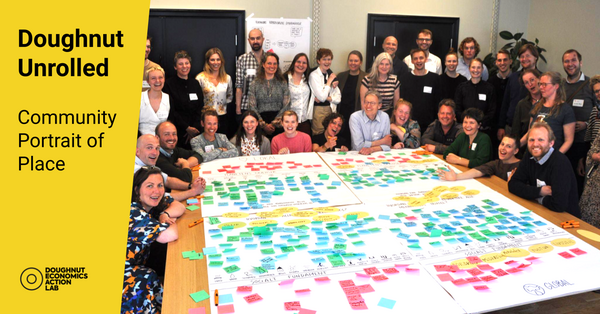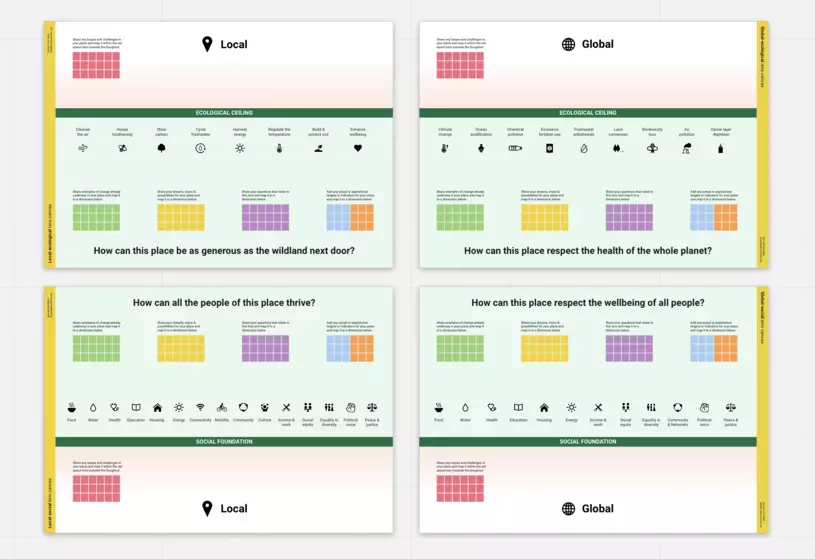
Doughnut Unrolled: Community Portrait of Place
A selection of participatory workshop approaches you can use to explore the four lenses for your place

Version 1.0 (April 2022)
📢 Now translated into French, Spanish, German and Brazilian Portuguese
Overview
The goal of the Doughnut is to meet the needs of all people within the means of the living planet, but what does this mean for the neighbourhoods, cities, districts or nations where we live?
To help you explore this question we've created Doughnut Unrolled, a concept that takes us from the Doughnut to four 'lenses' that invite you to look at the interplay between local aspirations and global responsibilities in your place – both socially and ecologically – and identify possible entry-points for transformative action.
.png)
This tool - Community Portrait of Place - is selection of participatory workshop approaches you can use to explore the four lenses for your place, to create a holistic picture or a 'portrait' of your place's local aspirations and global responsibilities, both socially and ecologically.
- Open the tool in the following languages here:
- Open the Miro canvases in the following languages here:
- All pdf canvases available here
The workshops can be run in-person and online. For the online setting, we've created this set of canvases in Miro (password: fourlenses) that is designed for you to copy, or 'duplicate' into your own Miro account. If you don't have a Miro account, you can create one for free, very easily - that will give you space for three boards. 
Community Portrait of Place is one of five Doughnut Unrolled tools that work together to apply the ideas of Doughnut Economics to your place:
- Introducing the four lenses
- Community Portrait of Place (this tool)
- Data Portrait of Place
- Exploring a topic
- Dimensions of the four lenses
Together they help you create a 'Doughnut Portrait' of your place - a holistic picture with diverse inputs and perspectives - that can act as a starting point for transformative action.
.png)
Whilst we are launching these tools in English we are also kicking off a process for translating all 5 tools into some languages and we will share more details of this in the following weeks.
Why use it?
Community Portrait of Place enables you to build up a holistic perspective of all the qualitative aspects of what it means for your place to thrive and to help bring humanity into the Doughnut.
It invites the people of your place to share their knowledge, ideas, experience and aspirations, to build a rich picture, or 'portrait' of your place, that can keep evolving as more voices contribute, and as knowledge, ideas, experience and aspirations changes over time.
It beautifully complements the Data Portrait of Place approach, that invites you to build up a holistic picture of the quantifiable aspects of what it means for your place to thrive and to help bring humanity into the Doughnut.
So we invite you to explore both these approaches - Data Portrait of Place and Community Portrait of Place - to build a rich and holistic portrait of your place, that draws upon both data and the many and various contributions from the people of your place.
Who is it for?
This tool is for anyone who wishes to explore what the ideas of Doughnut Economics means for them in their place.
Important note: If you wish to use these tools as part of your consultancy or professional advisory services for others, then we require that you follow DEAL's policy for consultancies and professional advisors.
How long does it take?
You can do a quick taster workshop that takes 90 minutes. You can do a half-day or full-day workshop. You can also build up your portrait over time through different methods and with different audiences.
There's a role for all of these approaches, and you might like to start with a quick taster workshop, or a half-day workshop, then think about how you might begin to plan a longer process of building up your portrait over time.
How many people is it for?
For any one workshop, you'll need to think about how many people can meaningfully contribute. This will be dependent on the size of space you have, the number of facilitators you have, and how people will be invited to share their contributions; e.g. if you map all contributions to one large four-lenses canvas, then you will need to keep the number below or around 40, but if everyone is working in smaller groups with their own canvas, then numbers can be larger.
What materials do you need?
You'll need to prepare a canvas, either printed or created in-person, or via Miro if online.
You'll need ways for people to contribute their ideas to the canvas, such as sticky-notes or similar.
What does the facilitator need to know or be able to do?
The facilitator needs to understand the concept of the four lenses, so we recommend you read Introducing the four lenses first.
The facilitator also needs to design the flow of the workshop according to the needs of the group and the intentions you have for the workshop, e.g. to introduce how holistic thinking can be beneficial to connect things and see new opportunities.
In the tool we give some example workshop structures, but there are so many variations that we focused on showing some of the approaches you can take to use in your own workshop design.
Acknowledgements
This tool was created by Rob Shorter, Leonora Grcheva, Kate Raworth and Andrew Fanning of the DEAL Team, in collaboration with Ruurd Priester.
The four lenses builds upon the methodology of Creating City Portraits co-created with Biomimicry 3.8, Circle Economy, and C40 Cities; and the workshop approaches build upon those developed by Civic Square.
We would like to thank the DEAL Community members who reviewed and tested this tool and offered feedback that helped in its development, including Mat Siffels of Amsterdam Donut Coalition, Ilektra Kouloumpi of Circle Economy, Jonas Boothe of Next Economy Lab (NELA) and Roisin Markham of Irish Doughnut Economics Network (IDEN). For anyone we’ve missed, thank you, and do let us know so we can acknowledge your contribution here.
We would also like to thank Iconmonster for the icons used.
Links
- Open the tool in the following languages here:
- Open the Miro canvases in the following languages here:
- All pdf canvases available here
Feedback
Healthy living systems rely on good feedback loops and we invite your comments, reflections and suggestion from using this tool to help us iterate and evolve for future versions.
You can do this two ways:
- The first is to leave a comment in the section below called Join the conversation. The benefit of this approach is that everyone can see and benefit from what you share.
- The second way is to contact the DEAL Team directly via the contact form and choosing the category 'Tools and Stories'.
Share
Share
-
Story

Doughnut Economics in planning and architecture
Webinar recording: Doughnut Economics in urban development and architecture - two case studies from Norway and the UK.
-
Story

Neighbourhood Doughnut Portrait Launch
We're excited to introduce you to the first Neighbourhood Doughnut Portrait, painted by many people together in Ladywood
-
Story

Launching our Data Portrait as an exhibition
A platform for lots of conversations with people and expanding our network in Minato Ward.
-
Story
Community Portrait of Glasgow
Bringing the Doughnut to ‘ARCadia’ - the community launch of University of Glasgow’s Advanced Research Centre
-
Story
.png)
Applying Doughnut Economics to businesses
Exploring how businesses and community organisations can support the economy of the future.
-
Story

Transforming places with the Doughnut - webinar 2
Watch the recording of two local governments working with Doughnut Economics in Brussels, Belgium and Nanaimo, Canada
-
Story

Transforming places with DE - webinar 1
Hearing from community-led initiatives in Leeds, UK and Melbourne, Australia
-
Member


Peter Ellery
Brownstown, Indiana, USA
Peter J. Ellery, PhD is a partner and researcher with E2praxis, LLC; a research consultancy specializing in community wellbeing. In this role, he combines his education and past research experience in health, education, and landscape architecture to explore sustainable solutions for communities using user-centered and collaboratively designed, placemaking strategies. Peter's work experience includes research using a variety of research methodologies including aerial data collection, imaging, and modeling, and his publication record includes book chapters and articles that explore the connection between wellbeing, health, and place.
-
Member


xavi mir
-
Member


Christophe Claude
erding
Born at 320ppm http://sealevel.info/co2.html climate worried physicist turned product manager
-
Member


Rachel Lyn Rumson
Maine, USA
What brings me to this community is that I work in my community for climate and economic action. I started a low-profit limited liability company to continue my work as a "permaculture developer" which is a planning and development approach to applied permaculture and design thinking. I am an activist that is committed to social innovation and I have a fierce ecological imagination. I have been writing and practicing "regenerative leadership" the best I can since 2007. Being an ancestor that did something is a deep edge and I work on my own healing there, as part of our collective healing. This is the scale where my leverage is the greatest and my capacity as a facilitator expands. I have navigated the local governance structure and funding opportunities, (not always has my work been funded) to offer a program that started a week ago, as 207permaculture. The day that I signed a contract with the State of Maine to provide services to three municipalities and one school district, for one year, to activate a network that will learn together and act together on climate and economic projects in the region, I saw The Schumacher Institute talk by Kate Rawworth in my email box. After the talk, joined my action co-lab would be well served to use these tools. The intergeneration and interdisciplinary group of leaders that gather will be approaching their town leadership and the State's Climate Action Plan Program Director with a vision of a thriving rural bioregion, and request support for their action plans. It is my hope that they will spinning off several other social innovations, educational pathways and businesses as well. I have a BA in Sociology from the University of Southern Maine, a MA in Applied Behavioral Science from the Leadership Institute of Seattle at Bastyr University, Advanced Permaculture Design Certifications, Soil Food Web Lab Certification. I am a Mom, a friend, a sister, a partner, unwed, a home cook, a future ancestor, a grant writer, a group facilitator, an educator and an serial entrepreneur. My pronouns are she and her.
-
Member

Tim Page
-
Member


Laura Zimmermann
Freiburg
I just finished my master's degree in Freiburg, studying in the M.Sc. programme Geography of Global Change. For my thesis I worked with Doughnut Economics and its practical applicability. I truly appreciate the support and treasure of knowledge of the DEAL community and platform. Now I am working at the Next Economy Lab in Bonn, realizing more Doughnut-related projects. I am drawn to the doughnut by its tangibility and immediate call for action: "Act now - theorize later!"
-
Member

Thomas Kerihuel
-
Member

Melanie Graddon
